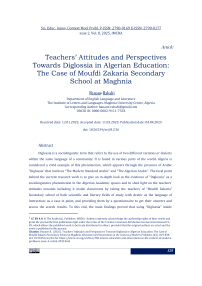Teachers’ Attitudes and Perspectives Towards Diglossia in Algerian Education: The Case of Moufdi Zakaria Secondary School at Maghnia
Автор: Hanane R.
Журнал: Science, Education and Innovations in the Context of Modern Problems @imcra
Статья в выпуске: 2 vol.8, 2025 года.
Бесплатный доступ
Diglossia is a sociolinguistic term that refers to the use of two different varieties or dialects within the same language of a community. It is found in various parts of the world. Algeria is considered a vivid example of this phenomenon, which appears through the presence of Arabic “Diglossia” that involves “The Modern Standard Arabic” and “The Algerian Arabic”. The focal point behind the current research work is to give an in-depth look at the existence of “Diglossia” as a sociolinguistics phenomenon in the Algerian Academic spaces and to shed light on the teachers’ attitudes towards including it inside classrooms by taking the teachers of “Moufdi Zakaria” Secondary school of both scientific and literary fields of study with Arabic as the language of instruction; as a case in point, and providing them by a questionnaire to get their answers and access the search results. To this end, the main findings proved that using “Diglossia” inside classrooms by the teachers can be a two-sided coin, which affects the pupils’ learning process and comprehension abilities.
Algerian secondary education, attitudes, Diglossia, teachers
Короткий адрес: https://sciup.org/16010447
IDR: 16010447 | DOI: 10.56334/sei/8.2.56
Текст научной статьи Teachers’ Attitudes and Perspectives Towards Diglossia in Algerian Education: The Case of Moufdi Zakaria Secondary School at Maghnia
Algeria is a diglossic and bilingual speech community. A diglossic language situation is described as consisting of two varieties of the same language, each of which has a clearly defined function (Ferguson, 1959). The high variety is used in formal settings such as religious texts, education, public speaking, and other prestigious contexts. In contrast, the low variety is reserved for use in informal and relaxed situations such as at home and on the street. Algeria is a heritage country, not only in terms of the urban aspect; but also, in terms of linguistic landscape as well. Algeria has many different languages and dialects, which most of this country's inhabitants are fluent in.
In addition to this, many Algerians are fluent in more than one language and they can speak different languages in addition to their approved official language Modern Standard Arabic, as we find French language, English language, and The Algerian Dialect “Daridja” which is considered as the effective and understandable means of communication between members of the Algerian society.
In particular, Algerian education uses the Modern Standard Arabic (MSA). It is mainly employed to teach literary streams. Sometimes, the teacher is obliged to use Algerian Arabic ( Daridja ) to simplify matters as much possible as he can and make them clear and smoother, and this dual use of both languages is called “Diglossia.” However, the contradiction between the use of “Modern Standard Arabic” and “Algerian Arabic” calls for a scholarly and scientific investigation to explore the attitudes of teachers towards “Diglossia” in the Algerian Educational context (Dahou, 2016). In the same vein, this research aims to:
-
1- Discuss “Diglossia” as a sociolinguistic phenomenon in the Algerian Educational context.
-
2- Shed light on the teachers’ attitudes towards “Diglossia” in the classroom.
To achieve these research objectives, the researcher set the following research questions:
-
a. What are the teachers’ attitudes towards using Algerian Arabic in secondary school?
-
b. How do teachers deal with their learners in the presence of this sociolinguistic
phenomenon?
To this end, the following hypotheses spring from the previous research questions
Sci. Educ. Innov. Context Mod. Probl. P-ISSN: 2790-0169 E-ISSN: 2790-0177 ssue 2, Vol. 8, 2025, IMCRA
-
1 - Teachers prefer using Diglossia occasionally to convey the messages better.
-
2 - Teachers resort to using this Diglossia to facilitate understanding of the lessons and make them more evident to the learners through switching from the “MSA” to the “AA” during the sessions and while explaining the lectures to their learners.


